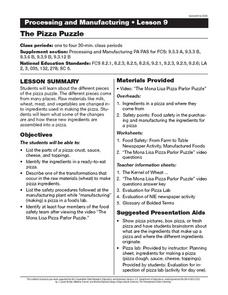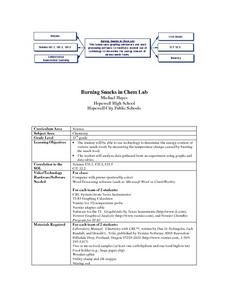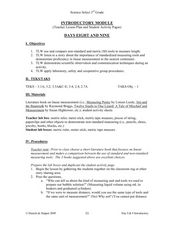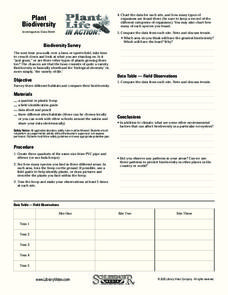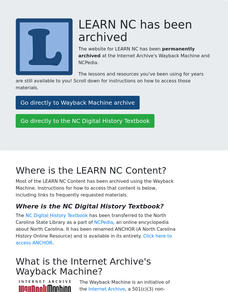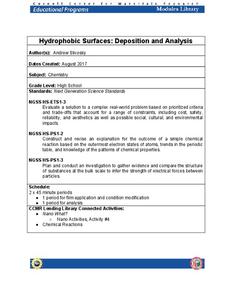Nuffield Foundation
A Closer Look at Blood
Here is a lab that has teenage scientists examining samples of their own blood under a microscope. Learners carefully prepare slides, then make detailed observations and identifying different types of cells using a key.
Achievement Strategies
CCSS Unit Design Template for Art
Art classes, like any lab class, require extensive preplanning and set-up time. Use this planning template in the quiet before the storm to identify the equipment and materials that will be needed, the procedures and processes...
Curated OER
The Pizza Puzzle
Students identify the origin and preparation of the main ingredients in pizza. They identify the food safety procedures followed in a pizza factory and then prepare and eat a pizza in class.
Curated OER
Burning Snacks in Chem Lab
Students determine the energy content of various snack foods. They measure the temperature changes in various snack foods as the foods are burned in order to determine the foods' energy content. Students create graphs and data tables of...
Curated OER
Exercise and Heartrate
Fourth graders experiment to find the effects of exercise on the heart rate. In this exercise and heart rate lesson, 4th graders create questions about exercise and heart rate. Students use the scientific method to test and analyze...
Curated OER
Introduction to Scientific Method
Students investigate safe laboratory procedures, classroom management guidelines, and group roles and procedures. They study a set of safety guidelines with their parents, and to sign a contract stating that they understand the...
Curated OER
Introductory Module
Third graders examine the non-standard method of measurement and compare it to the metric system of measurement. For this introductory module lesson, 3rd graders discover the scientific observation. Students also develop communication...
Curated OER
Plant Life in Action
Sixth graders examine various habitats and record the living creatures they found. In this biodiversity lesson, 6th graders complete a worksheet recording their observations. Students draw conclusions about the climate and its effect on...
Curated OER
Sheep Heart Dissection
Fifth graders examine a sheep heart. In this biology lesson, 5th graders dissect a sheep heart to identify the parts of a heart including the aorta, valve, septum, and ventricle.
Curated OER
Integrating Technology In Your Classroom
You can try these management tips and lessons to help you confidently integrate technology into your curriculum.
Curated OER
Introduction to Gases
Students are introduced to gases. In this science lesson plan, students demonstrate that gases are a state of matter, generate a number of gases, discover some properties of gases, compare some of the properties of different gases, and...
Curated OER
Types of Chemical Reactions
Students conduct labs to gain an overview of chemical reactions. They observe examples of synthesis, decomposition, single displacement and double displacement reactions. They identify certain products by the use of litmus and splint tests.
Kenan Fellows
The Newton Challenge
Make Newton proud. Scholars apply their understanding of forces and energy to an engineering design challenge. They learn about simple machines, create a presentation on Newton's laws, and develop a balloon-powered car.
Curated OER
Allocating Energy from a Photovoltaic System
How much electricity do you use in a day? Physics fanatics calculate their energy use by consulting a chart of the watts required to run typical household appliances. They compare power to amounts of electric energy used or generated....
Cornell University
Hydrophobic Surfaces—Deposition and Analysis
Couches, carpets, and even computer keyboards now advertise they are spill-resistant, but what does that mean? Scholars use physical and chemical methods to coat surfaces with thin films to test their hydrophobic properties. Then they...
Curated OER
Teen Driving: Skills, Responsibilities and Reactions
As an introduction to the skills required for and responsibilities of driving, pre-teens and teens engage in a series of activities, chart their response times, and analyze how variables effect these reaction times. Class groups use the...
American Chemical Society
Why Does Water Dissolve Sugar?
Did you know that if you wait long enough, the M on the outside of an M and M will float to the surface when submerged in water? Learners observe the sugar coating of an M and M while it is dissolving in water. They explain how this...
Orange Public Schools
Stagecraft
The house lights dim, the curtain parts, lights slowly come up, revealing the stage. Before the actors appear, before a word is spoken, the audience is drawn in by the lighting, by the colors, by lines of the set, by the props, and...
Curated OER
Protect the Skin You're in
Students explore the importance of sun safety in relationship to skin cancer prevention. They test the effectiveness of various sunscreens and administer and analyze a simple survey to their peers. In addition, they implement a public...
Curated OER
The Influence of Carbon Dioxide on the Chemistry of Soda
Students investigate the carbon dioxide content of different sodas. In this chemistry lesson, students explain why PET containers are preferable than HDPE for soda bottles. They collect data and graph them.
Curated OER
Making Soap
Students explore what chemical indicators are and use pH paper to determine if something is alkaline or basic. In this pH lesson students manufacture their own soap.
Curated OER
Determining Acids and Bases
Students test various liquids and identify as acids or bases. In this chemistry and pH lesson, the students use purple cabbage indicator to test a variety of teacher-provided substances, then bring in liquids from home to test acidity....
Curated OER
Geologic Sequestration
Young scholars investigate how geologic sequestration reduces carbon dioxide concentration in the atmosphere. In this earth science lesson, students simulate oil mining in the lab. They write down their observations and complete the lab...
Curated OER
How Much Energy is Stored in Wood?
In this energy lesson plan, students create calorimeters out of soda cans and use them to calculate the amount of energy stored in different types of wood.




